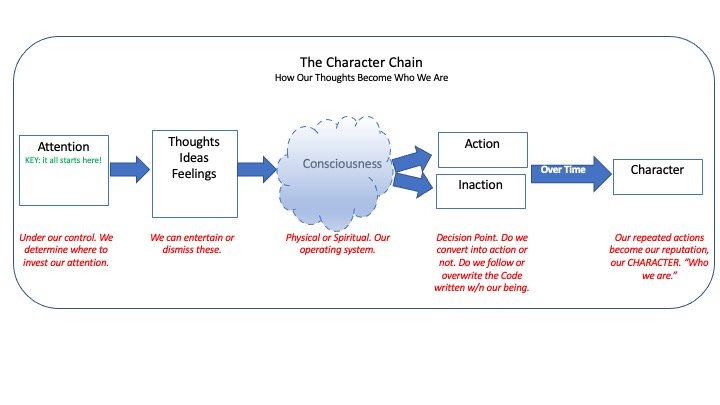Who are we, and how did we get this way?
For the sake of my children, my grandchildren, and my (yet-to-be) great-grandchildren, I want to explain what I call “The Character Chain.” In the simplest terms, what we do becomes who we are. We all know that, right? However, it's in the same way that we know "you are what you eat,” as we have a Costco hotdog. Is there a way we can move this thought from the back of our minds to the front? I hope this helps.
In my journal on May 25, 2021, I wrote, "my character will be formed one way or another, either by chance (culture) or by choice.” Rethinking and rethinking this thought produced the below exhibit:
We are continually processing information. Our eyes and ears receive millions of impressions daily; some of these impressions are turned into thoughts, and others are actions. Some of the actions become habits. Over time, these habits develop our character. As you move from left to right in the above exhibit, there are two key trigger points: Attention and Consciousness. Fortunately, we have some measure of control over these.
Here's why this is important:
Treat your attention as the most important investment you make. As noted psychologist William James said, "My experience is what I agree to attend to." Epictetus, the Greek philosopher, A.D. 55 to 135, said, “You become what you give your attention to. If you don’t choose what thoughts and images you expose yourself to, someone else will." Our attention produces thoughts, feelings, and ideas, delivering us to our second trigger point: Consciousness. Through this filter, we decide whether to act or not.
In psychology today, Mickey a Fearer wrote,
“We live in a time when attention has become our most valuable asset, with multiple stakeholders competing. As a result, remaining in charge of our minds has become a daily challenge.
Our attention defines our experience, which sets the mindset of our minds.
What starts as reading the current events for a few seconds can become an obsessive habit of checking for new information every 20 minutes, which defines our thinking.
Repeated thought patterns of hopelessness generate anxiety and other negative feelings, which, after a while, turn into a mood.
Minutes turn into hours and sleepless nights. A mood can elevate or "ruin" an entire day, a week, or a month.”
Before we know it, habit constitutes the basis of our inner attitude or mindset. It becomes part of our identity, and we are "depressed" or "anxious" people.
Tim Wu, Author of the book Attention Merchants, said, “One thing I learned writing this book is just how difficult it is to control your attention. We aren't that great at paying attention to what we decide to pay attention to — the voluntary control is weak.”
“For how we spend the brutally limited resource of our attention will determine those lives to a degree most of us may prefer not to think about.
“My experience is what I agree to attend to.”
Personal Experience:
Here's one way I've learned to control my "attention investment.” It happens, in silence, first thing in the morning. I spent a few minutes reading something related to the person I want to become. It may be religious or other ancient text, personal development, poetry, etc. (I'm not saying you should do the same thing or read the same books. I'm just saying that you should develop a practice to control your attention.)
Try it for a few days. Start with two minutes* and ensure it's done before you check email, text, or turn on the television or radio. You'll let someone else control your attention investment if you don't.
(*) From Atomic Habits by James Clear: Even when you know you should start small, it's easy to start too big When you dream about making a change, excitement inevitably takes over and you end up trying to do too much too soon. The most effective way I know to counteract this tendency is to use the Two-Minute Rule, which states, "When you start a new habit, it should take less than two minutes to do."
You'll find that nearly any habit can be scaled down into a two-minute version:• 'Read before bed each night" becomes "Read one page?
"Run three miles" becomes "Tie my running shoes."
Conclusion.
Take responsibility for your attention. Become aware of where it is being invested. If needed, redirect it to where it will get its highest return. Attention leads to thoughts, actions, habits, and character. Repeat after me, “As my attention is today, so shall I be tomorrow.”



